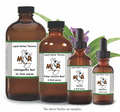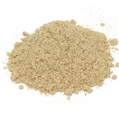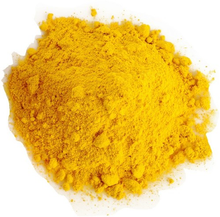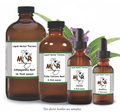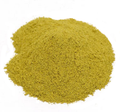 Loading... Please wait...
Loading... Please wait...- Home
- Bulk Herbs
- Herbs (T-V)
- Turmeric Root Powder
- Home
- Herbs - Organically Grown & Wild Crafted USA
- R S T
- Turmeric Root Powder
- Home
- Herbs from Hawaii
- Turmeric Root Powder
Turmeric Root Powder
Product Description
Turmeric Root Powder
Organically Grown USA-Hawaii
Also Known As - Curcuma longa, Common turmeric, Indian saffron, yellow ginger
Overview - Turmeric has a peppery, warm and bitter flavor and a mild fragrance slightly reminiscent of orange and ginger, and while it is best known as one of the ingredients used to make curry, it also gives ballpark mustard its bright yellow color.
Turmeric comes from the root of the Curcuma longa plant and has a tough brown skin and a deep orange flesh. Turmeric has long been used as a powerful anti-inflammatory in both the Chinese and Indian systems of medicine. Turmeric was traditionally called "Indian saffron" because of its deep yellow-orange color and has been used throughout history as a condiment, healing remedy and textile dye.
Not only is Turmeric a spice that is used in many dishes today, it can also be taken as a tincture, dietary supplement capsule, and even smoothies!
Medicinal Uses - Turmeric is used for arthritis, heartburn (dyspepsia), stomach pain, diarrhea, intestinal gas, stomach bloating, loss of appetite, jaundice, liver problems and gallbladder disorders.
It is also used for headaches, bronchitis, colds, lung infections, fibromyalgia, leprosy, fever, menstrual problems, and cancer. Other uses include depression, Alzheimer’s disease, water retention, worms, and kidney problems.
Some people apply turmeric to the skin for pain, ringworm, bruising, leech bites, eye infections, inflammatory skin conditions, soreness inside of the mouth, and infected wounds.
TURMERIC USES & EFFECTIVENESS
- Osteoarthritis. Some research shows that taking turmeric extracts, alone or in combination with other herbal ingredients, can reduce the pain caused by osteoarthritis. In one study, turmeric worked about as well as ibuprofen for reducing osteoarthritis pain.
- Alzheimer’s disease. Early research shows that taking curcumin, a chemical found in turmeric, daily for 6 months does not benefit people with Alzheimer’s disease.
- Eye inflammation (anterior uveitis). Early research suggests that taking curcumin, a chemical found in turmeric, might improve symptoms of long-term inflammation in the middle layer of the eye.
- Colorectal cancer. Early research suggests that taking turmeric might stabilize some measures for colon cancer. There is also early evidence that taking curcumin, a chemical found in turmeric, daily for 30 days can reduce the number of precancerous glands in the colon of people at high risk of cancer.
- Bypass surgery (coronary artery bypass graft surgery). Early research suggests that taking curcumin, a chemical found in turmeric, 3 days before surgery and continuing for 5 days after surgery can lower the risk of a heart attack following bypass surgery.
- A type of inflammatory bowel disease called Crohn’s disease. Some evidence suggests that taking curcumin, a chemical found in turmeric, daily for one month can reduce bowel movements, diarrhea, and stomach pain in people with Crohn’s disease.
- Diabetes. Early research suggests that taking turmeric daily for 9 months can reduce the number of people with prediabetes who develop diabetes.
- Stomach upset (dyspepsia). Some research shows that taking turmeric by mouth might help improve an upset stomach.
- Gum disease (gingivitis). Early research suggests that using a turmeric mouthwash is as effective as a drug-therapy mouthwash for reducing gum disease and bacteria levels in the mouth, but not for reducing plaque.
- Stomach ulcers caused by Helicobacter pylori (H pylori) infection. Early research suggests that taking turmeric daily for 4 weeks is less effective than conventional treatment for eliminating certain bacteria (H. pylori) that can cause stomach ulcers.
- Irritable bowel syndrome (IBS). Early research suggests that taking a turmeric extract daily for 8 weeks reduces the occurrence of IBS in people with IBS who are otherwise healthy.
- Skin rash (Lichen planus). Taking a certain product containing chemicals found in turmeric daily for 12 days can reduce skin irritation caused by lichen planus.
- Kidney inflammation (Lupus nephritis). Early research suggests that taking turmeric daily for 3 months can reduce blood pressure and improve kidney function in people with kidney inflammation.
- Stomach ulcers (peptic ulcer disease). Early research suggests that taking turmeric daily for 4 weeks does help heal stomach ulcers.
- Itchy skin (pruritus). Early research suggests that taking a specific product (C3 Complex) that contains curcumin, a chemical found in turmeric, and an extract of black or long pepper (Bioperine) can reduce skin itching and improve quality of life in people with chronic itching.
- Rheumatoid arthritis (RA). Early research suggests that curcumin, a chemical in turmeric, might help reduce some symptoms of rheumatoid arthritis.
- Skin wounds due to cancer. Early research suggests that applying a turmeric ointment might help to relieve odor and itching caused by wounds associated with different types of cancer.
- Recover from surgery. Early research suggests that taking curcumin, a chemical found in turmeric, daily for up to one week after surgery can reduce pain, fatigue, and the need for pain medications.
- Tuberculosis. Early research suggests that taking a product containing turmeric and Tinospora cordifolia can reduce bacteria levels, improve wound healing, and reduce liver toxicity in people with tuberculosis who are also receiving antituberculosis therapy.
- A type of inflammatory bowel disease called ulcerative colitis. Early research suggests that taking curcumin, a chemical found in turmeric, daily for up to 6 months can reduce symptoms and the recurrence of ulcerative colitis when used in combination with conventional treatments.
- Jaundice.
- Hepatitis.
- Diarrhea.
- Fibromyalgia.
- Liver and gallbladder problems.
- Headache.
- Menstrual problems.
- Pain.
- Ringworm.
- Bruising.
Special Precautions & Warnings:
Pregnancy and breast-feeding: During pregnancy and while breast-feeding, turmeric is LIKELY SAFE when taken by mouth in amounts commonly found in food. However, turmeric is LIKELY UNSAFE when taken by mouth in medicinal amounts during pregnancy. It might promote a menstrual period or stimulate the uterus, putting the pregnancy at risk. Do not take medicinal amounts of turmeric if you are pregnant. There is not enough information to rate the safety of medicinal amounts of turmeric during breast-feeding. It is best not to use it.
Gallbladder problems: Turmeric can make gallbladder problems worse. Do not use turmeric if you have gallstones or a bile duct obstruction.
Bleeding problems: Taking turmeric might slow blood clotting. This might increase the risk of bruising and bleeding in people with bleeding disorders.
Diabetes: Curcumin, a chemical in turmeric, might decrease blood sugar in people with diabetes. Use with caution in people with diabetes as it might make blood sugar too low.
A stomach disorder called gastroesophageal reflux disease (GERD): Turmeric can cause stomach upset in some people. It might make stomach problems such as GERD worse. Do not take turmeric if it worsens symptoms of GERD.
Hormone-sensitive condition such as breast cancer, uterine cancer, ovarian cancer, endometriosis, or uterine fibroids: Turmeric contains a chemical called curcumin, which might act like the hormone estrogen. In theory, turmeric might make hormone-sensitive conditions worse. However, some research shows that turmeric reduces the effects of estrogen in some hormone-sensitive cancer cells. Therefore, turmeric might have beneficial effects on hormone-sensitive conditions. Until more is known, use cautiously if you have a condition that might be made worse by exposure to hormones.
Infertility: Turmeric might lower testosterone levels and decrease sperm movement when taken by mouth by men. This might reduce fertility. Turmeric should be used cautiously by people trying to have a baby.
Iron deficiency: Taking high amounts of turmeric might prevent the absorption of iron. Turmeric should be used with caution in people with iron deficiency.
Surgery: Turmeric might slow blood clotting. It might cause extra bleeding during and after surgery. Stop using turmeric at least 2 weeks before a scheduled surgery.
Other Uses: Apart from therapeutic uses, turmeric is also used as an important spice, in beauty products and in spiritual ceremonies.
- • In India, turmeric is used in almost all curries and gravy dishes. It gives a rich color and a unique flavor to the food.
- • Turmeric is a well-known preservative. Scientists from Gujarat found that adding turmeric to paneer (cottage cheese) extends the shelf life of paneer up to 12 days.
- • Turmeric is a great pesticide. Sprinkle turmeric (powder) water near all the entry points of your house to ward of insects, ants, and termites.
- • Women in India use turmeric in skin products such as creams and body scrubs to boost the glow factor.
- • Turmeric has an important place in Indian weddings. Turmeric paste is applied to the bride and the groom as part of the haldi ceremony just before the wedding to give them fresh glowing skins and to ward off the evil eye.
- • Turmeric is considered a symbol of purity, prosperity, and fertility.
- • Turmeric water is poured / offered to the gods in the temples as a part of Hindu ritual called Abhishekam.
- • The color yellow is considered sacred and auspicious in India. The cloths dyed in turmeric are considered pure.
- • Drinking turmeric tea daily may well increase your life span, suggests Dr Andrew Weil. Adding one teaspoon of turmeric powder to 4 cups of boiling water, simmering it for 10 minutes and adding honey to taste can do the trick.
- • Adding turmeric to meat can reduce the levels of cancer causing heterocyclic amines (HCAs) by up to 40 percent, according to researchers from Kansas State University.
Disclaimer - These products are not intended to diagnose, treat cure or prevent any disease. Reviews are not intended as a substitute for appropriate medical care or the advice of a physician or another medical professional. Actual results may vary among users. Mountain Maus Remedies LLC makes no warranty or representation, expressed or implied, as to the accuracy or validity of the information contributed by outside product review submissions, and assumes no responsibility or liability regarding the use of such information. The information and statements regarding the dietary supplements have not been evaluated by the Food and Drug Administration. If you have a medical condition or disease, please talk to your health care provider. If you are currently taking a prescription medication, you should work with your health care provider before discontinuing any drug or altering any drug regimen, including augmenting your regimen with any herb or dietary supplements. Do not attempt to self-diagnose any disease or ailment based on the reviews and do not use the information contained herein for diagnosing or treating a health problem or disease. Proper medical care is critical to good health. If you have a health concern or suspect you have an undiagnosed sign or symptom, please consult a physician or health care practitioner.
© Mountain Maus Remedies. All Rights Reserved
Find Similar Products by Tag
Find Similar Products by Category

Product Reviews
-
Quality

Posted by Unknown on 17th Oct 2023
We’ve been purchasing turmeric root powder from Mountain Maus for some time now and found it to be robust in flavor, fresh and pure. We plan to continue to order from them and appreciate their kind customer service.
-
Life saver!

Posted by Jamie Barkman on 16th Mar 2020
This tumeric has been a lifesaver! This is my second order of it. From Golden Milk Lattes to shots with garlic and acv, it has kept me healthy all winter. Great quality.






